Plastic Free Tea Bags: Which Brands Are Really Plastic Free?
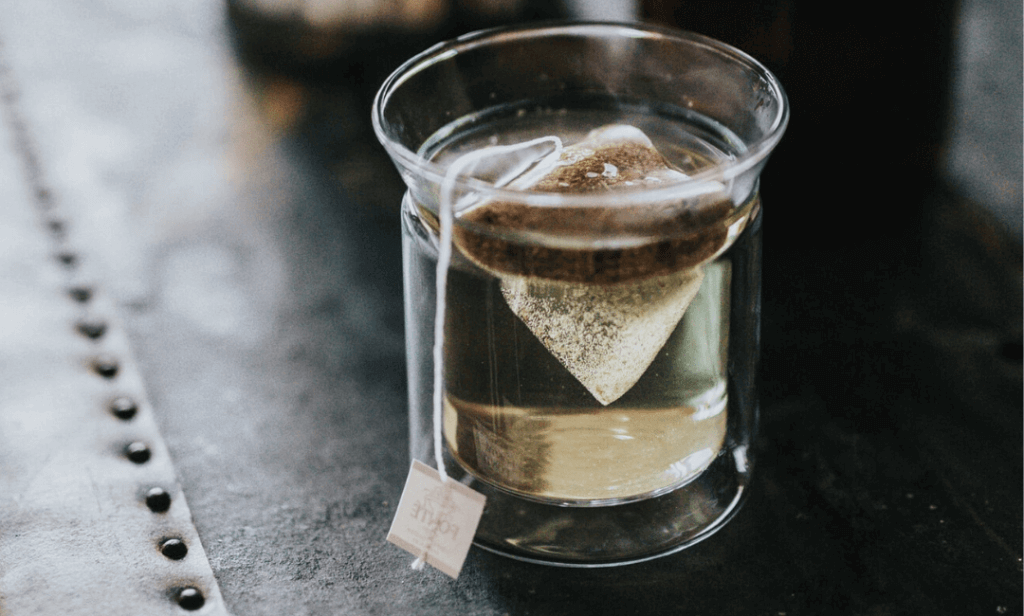
Plastic free tea bags? Yes, you heard that right…
Your cup of tea might contain 11 billion microplastic particles and this is due to the way the tea bag is engineered.
According to a 2019 Canadian study at McGill University published in the Environmental Science & Technology Journal, steeping a plastic tea bag at a brewing temperature of 95°C releases around 11.6 billion microplastics and 3.1 billion nanoplastics into a single cup. Microplastics are tiny pieces of plastic between 100 nanometres and 5 millimeters in size. Compared to salt, for example, which has been also found to contain plastic, each cup contains thousands of times the greater mass of plastic, at 16 micrograms per cup.
Health Risks Posed by Microplastics in Tea Bags
Researchers are studying the health risks posed by ingesting microplastics from tea bags and several studies are being published on this topic. A 2023 study in the Journal of Environmental Science and Research Pollution International investigated 45 teabag samples of different Persian and German brands. The results were an abundance of microplastics and phthalates. Another study published in 2023 in the International Journey of Surgery cites a wide variety of health conditions, including endocrine disruption, reproductive toxicity, cancer risk, problems with metabolism and nutrition, and interference with neurodevelopment, as concerns related to microplastic exposure, particularly to those heated during processing, like tea bags used in million cups of tea over a lifetime.
How are Tea Bags Manufactured?
Let’s go one step back and understand how a tea bag is made and why it might contain plastic:
How a teabag is made | Inside the Factory
Ever wondered how a teabag is made? ☕️
Posted by BBC Two on Tuesday, 18 July 2017
Are you shocked? Yes, we were too. We couldn’t believe that incorporating plastic in tea bags wasn’t tested for migration before engineering them, without even mentioning the fact that they are of course not biodegradable and compostable, which leads to plastic pollution.
So, Why Do Tea Bags Contain Plastic?
Many traditional tea bags contain plastic as this is used to heat seal the filter bag and to prevent it from falling apart. It can be:
- inside the paper filter bags and/or
- in the glue used to heat seal the bags, mostly in the form of polypropylene (PP).
Both of these materials can migrate into hot water. Most tea manufacturers that used to use plastic in the filter bags are now transitioning to biodegradable PLA polylactic acid based material (see the explanation below).
List of Plastic Free Tea Bags, and Tea Bags Using Plastic by Brand
Here is a 2024 updated guide to some of the most available and favorite plastic free tea brands in the USA / Canada, the UK, Australia, and other English-speaking countries.
This post contains affiliate links, which means we may receive a small commission, at no cost to you, if you make a purchase through a link. This helps us continue the very hard work we put into researching products and solutions. It took us weeks to compile this overview.
Important Disclaimer: While we make our best efforts to scout completely plastic-free tea bags around the world, we are also aware that we have to rely on the information provided to us by tea companies via their website / FAQ section (we link to the source) or upon our direct request. We disclose their answers and list the sustainable tea brands in alphabetical order to make it easier for you to find them.
Please note: we also list some varieties made with plastic as we received many questions about some specific product ranges.
1) Barry’s Tea
Barry’s Tea states that after significant investment in the redesign and development of their machinery, 100% of the black tea range, produced in Cork and available in shops is biodegradable. Since the end of September 2021 all of the Fruit, Herbal, and Green teas are now available in biodegradable tea bags. According to the manufacturer, you can put the tea bags in your food waste bin at home for industrial composting. The manufacturer confirmed that their tea bags have a special blend of biodegradable PLA thermoplastic fibers, abaca, and selected cellulosic fibers.
Plant-based Bioplastics / PLA: Yes
Fossil-fuel Plasticizers: No
Source: website’s sustainability page and direct communication.
Shop Barry’s Tea on Amazon: USA – Canada – UK – Australia
2) Bromley:
Response by the manufacturer: “Our teabag paper is made from wood pulp. They are heat sealed together without using glue. They do not contain any plastics of any kind and are totally compostable.”
Source: e-mail.
Plant-based Bioplastics / PLA: No
Fossil-fuel Plasticizers: No
Shop the Bromley tea range free of plastic at Amazon: USA – Canada
3) Bushells
Their tea bag paper is made from manila hemp, cellulose and thermoplastic fibers, as such they are not compostable or recyclable.
Source: e-mail. The company didn’t reply to our request for an update.
Plant-based Bioplastics / PLA: Yes
Fossil-fuel Plasticizers: Yes
4) Celestial Seasonings
Their pillow tea bags (i.e. tea bags without strings, tags, staples, or foil envelopes) have food-grade polypropylene plastic fibers, are manufactured through a totally chlorine-free (TCF) whitening process, meaning that no dioxin is released into the environment. Plus, they never contain starch or gluten.
On the other hand, their TeaWell products, their food-service style products, and their certified organic Canadian teas use tea bag paper that does not contain any plastic fibers and has a string, tag, staple, and individual wrapper.
Information Source: response via Facebook messenger.
Plant-based Bioplastics / PLA: n.a.
Fossil-fuel Plasticizers: Yes
Shop Celestial Seasonings tea on Amazon: USA – Canada – UK – Australia
Related: 13 Best Plastic-free Electric Kettles for a Heathy Cup
5) Dilmah
The tagless tea bags are made from biodegradable PLA material and are also called “pot bags”.
Their pyramid style Exceptional Tea Selection range are also made with a plastic-free PLA material and are biodegradable.
Their standard teabags (non-pyramid bags that have a string, a tag, and often an envelope) i.e. Dilmah Premium Tea Selection, Ceylon Green Tea and Infusions are composed mostly of natural cellulose fibers which contain no plastic coating such as epichlorohydrin and do not use chemical paper bleaching. Currently, these tagless teabags which do not use a staple or string to seal their tea bag contain 2% of polypropylene fibers used only for the heat seal that joins the bag together. These polypropylene fibers are a food-safe material that does not leech into water (like nylon or PET). For environmental reasons, however, some choose to use loose leaf tea or organic teabags.
Information Source: website and their sustainability report (which breaks down the packaging and material information of all tea formats in their product portfolio).
Plant-based Bioplastics / PLA: Yes
Fossil-fuel Plasticizers: Yes
Shop the Dilmah range at Amazon: USA – Canada – UK – Australia
6) Harney & Sons
From the manufacturer: “Our paper tea bags are compostable, oxygen bleached with a method that does not produce dioxins, there is no epichlorohydrin, PET, or PLA in our paper tea bags. We offer a variety of certified organic teas in them. The tea bags are fastened with a knot in the string, there is no glue or staple on the tea bag, and they are a great choice if you have any concerns about plastics.”
About their sachet fabric tea bags: “We are excited to announce that we started producing sachet fabric from compostable sugarcane in 2021, and have now achieved 90% sugarcane material use on our product lines. We have been using the new material in production alongside our BPA free food grade nylon. Please note that the new material is industrial compostable and any nanoparticles created during steeping are digested by the body. The sugarcane does not produce any increase in the glycemic content of our teas.”
Information Source: e-mail and website blog.
Plant-based Bioplastics / PLA: Yes.
Fossil-fuel Plasticizers: Yes
Shop the Harney & Sons range at Amazon: USA – Canada – UK – Australia
7) Higher Living Organic Tea Australia
Higher Living has created compostable, plastic-free tea bags made out of unbleached paper with an organic cotton string stitched into the paper to form the bag, with no plastic. The envelopes and the boxes are recyclable.
Information Source: response via e-mail
Plant-based Bioplastics / PLA: No
Fossil-fuel Plasticizers: No
Shop the Higher Living range on Amazon: Australia
8) Ito En
Oi Ocha Green Tea Tea Bags: Just paper, no glue.
Oi Ocha Hoji Tea Bags: Just paper, no glue.
Matcha Green Tea Traditional: BPA-free PET or nylon mesh that meets FDA regulatory requirements for hot beverage contact applications. And food grade glue is used to attach teabag and string.
Information Source: response via e-mail.
Plant-based Bioplastics / PLA: Yes, in some of their products
Fossil-fuel Plasticizers: Yes, in some of their products
Shop Ito En on Amazon: USA – Canada – UK – Australia
Related: Microplastics in Food: The Latest Research.
9) Lidl UK – Deluxe Tea
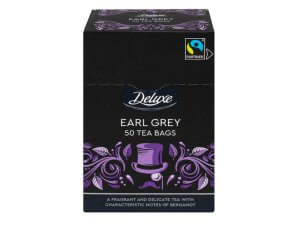
We enquired via email with Lidl Great Britain about their Deluxe Earl Grey tea bags and they replied after verifying with the supplier saying that they offer biodegradable tea bags made of cellulose fibers (from softwood pulp & abaca) + polylactic acid (PLA).
Information Source: response via e-mail.
Plant-based Bioplastics / PLA: Yes
Fossil-fuel Plasticizers: No
10) Lidl USA
We enquired via email about the following product ranges: The Organic Tea Range / The Irish Breakfast Tea / The Preferred Selection Range. They replied that according to their supplier, the tea bags are made with filter paper and comprise a blend of cellulose fibers (wood pulp), Abaca, and a very small amount of acrylic binder (to prevent microwave bursting) and PAE (Poly-Amide-Epichlorohydrin) as a wet strength plastic resin (so the paper doesn’t fall apart in water).
Information Source: response via e-mail.
Plant-based Bioplastics / PLA: Yes
Fossil-fuel Plasticizers: Yes
11) Lipton
Their Quality Black and Intense Quality Black Tea traditional tea bags are made from Manilla hemp and cellulose fibers. They are compostable tea bags, but not recyclable. Please note: we received an email in July 2022 from one of our readers who stated receiving a different answer from the manufacturer and that their tea bags are lined with polyethylene. This shows a lack of transparency and we couldn’t find any source of information on their website apart from the Cold Brew Tea Bags.
Lipton Green Decaf, Chai and Herbal traditional tea bags are made from manilla hemp, cellulose and thermoplastic fibers. They are not compostable or recyclable.
Lipton Cold Brew Tea Bags are made of plant-based biodegradable PLA material.
Information Source: response via e-mail.
Plant-based Bioplastics / PLA: Yes
Fossil-fuel Plasticizers: Yes
Shop this Lipton range on Amazon: USA – Canada – UK – Australia
12) Lyons
The company that makes tea bags in the UK, has phased out plastics entirely from their tea range and has transitioned to biodegradable and compostable plant-based tea bags.
The Lyons biodegradable teabags are now all plant-based and made of a blend of natural fibers, including abaca, cellulose fibers, and a small amount of plastic fibers. They do not use PLA in their teabags. The thermoplastic fibers used in their teabags are necessary to seal the tea bag and prevent the tea leaves from escaping. However, they say that the amount used is minimal, making up less than 5% of the teabag paper. In their words: “Our commitment to sustainability is paramount, and we are constantly seeking ways to minimize our impact on the environment. Our biodegradable teabags are designed to break down naturally in composting conditions, leaving no harmful residues. We have also eliminated the use of staples and glue in our teabags to make them even more eco-friendly.”
Information Source: response via e-mail and their website.
Plant-based Bioplastics / PLA: No
Fossil-fuel Plasticizers: Yes
Shop the Lyons range on Amazon: USA – Canada – UK
13) Madame Flavour Australia
Madama Flavour is an Australian family tea business with French and Kiwi roots.
The pyramid bags are made from Soilon and have a silky finish, no staple. Soilon is a PLA corn-starch derived material sourced from Japan and is fully biodegradable according to their statement. The tags are attached to the pyramid material by ultrasonic heat, with no glue involved. Source: Madame Flavour website.
Information Source: response via e-mail and their website.
Plant-based Bioplastics / PLA: Yes
Fossil-fuel Plasticizers: No
14) Madura Australia
In July 2021 they transitioned to 100% natural plant-based PLA tea bag paper and tea bag componentry. The fully sustainable and renewable fibres are made from a selected blend of high-quality Manila hemp, cellulose and biopolymer made from natural plant material. The transition occurred on across all 50’s & 100’s tea bag packets, as well as 20’s & 80’s enveloped tea bag packets.
The Leaf Infuser (pyramid) teabags have for a long time been made exclusively from 100% natural plant-based PLA tea bag paper, and not only do they not emit plastic microparticles or nanoparticles, and they are compostable. They do however recommend that you place these teabags out in your green bin as they break down best under commercial waste conditions.
Information Source: FAQs on their website.
Plant-based Bioplastics / PLA: Yes
Fossil-fuel Plasticizers: No
Shop the Madura range on Amazon: Australia
15) Nature’s Cuppa Organic Tea
The manufacturer – EatRite Australasia Pty Ltd – who is based in Australia responded that their tea bags are made with unbleached paper (made from a tree grown especially for tea bag paper mainly in the northern part of Europe), and no polymers, nor plasticizers. Nature’s Cuppa is also certified organic by the National Association of Sustainable Agriculture Australia (NASAA) and NOP (USDA) Regulation certified by Control Union Certification, which wouldn’t be achievable if they included plastic according to the manufacturer. The tea bags are closed with a metal staple.
Information Source: response via e-mail.
Plant-based Bioplastics / PLA: No
Fossil-fuel Plasticizers: No
Shop Nature’s Cuppa on Amazon: USA – Australia
16) Nerada Australia
Their filter paper is manufactured using a blend of high-quality manila hemp, which contains a tiny percentage (less than 2%) of food-grade synthetic fibers. Source: blog post on their website.
Information Source: response via e-mail.
Plant-based Bioplastics / PLA: Yes
Fossil-fuel Plasticizers: Yes
Shop the Nerada tea range on Amazon: Australia
17) Pukka
Pukka is famous for their herbal tea. Their tea bag paper is made of a special blend of natural abaca (a type of banana), wood pulps, and plant cellulose fibers. They use a simple stitch of organic cotton and a unique folding process. They don’t need to use polypropylene to hold their Pukka herbs tea bags together and these are therefore free from plastic and home compostable (they are even applying for an independent certification). They were the first company to ever use 100% organic, non-GMO cotton tea bag strings to hold the teabags together without the need for a metal staple or polypropylene.
Information Source: response via e-mail and their website. Find out more here.
Plant-based Bioplastics / PLA: No
Fossil-fuel Plasticizers: No
Shop the Pukka tea range on Amazon: USA – Canada – UK – Australia
18) Qi Tea Australia and New Zealand:
Qi tea bags are plastic-free and biodegradable. They try to keep all their packaging as completely plastic free as possible so it’s 100% recyclable and use veggie inks so it’s also compostable. The only part that has a little plastic is the envelope wrapper because it helps keep it fresher longer, but they are working on an alternative substrate for that. Qi Teas are independently certified organic by the international accreditation body Ecocert, as well as the Soil Association in the UK. The bags are not bleached and are free from glue and aluminum staples.
Information Source: response via e-mail and their website.
Plant-based Bioplastics / PLA: No
Fossil-fuel Plasticizers: No
Shop Qi Tea on Amazon: UK – Australia
19) Stash Tea
The filter paper used for Stash Tea bags is made from 100% cellulose fibers (wood). Stash tea bag filter paper is machine folded and pressed, therefore no glue is needed or used. Their teabags are completely compostable and do not contain any plastic. The tea producer states that test results conclude that chlorine dioxide is not present in their tea bag filter paper. The filter paper is not coated with the compound epichlorohydrin, and does not contain any free epichlorohydrin.
Information Source: via their website.
Plant-based Bioplastics / PLA: No
Fossil-fuel Plasticizers: No
Shop Stash Tea on Amazon: USA – Canada
20) Teapigs
Teapigs tea bags (tea temples) are made from corn starch and paper. They break down in industrial composting within 12 weeks. The inner bag looks like plastic, but is made from wood pulp and can be home composted. The cardboard is FSC certified paper board and printed with vegetable ink, therefore it is recyclable.
Information Source: via their website.
Plant-based Bioplastics / PLA: Yes
Fossil-fuel Plasticizers: No
Shop Teapigs on Amazon: USA – Canada – UK – Australia
21) Tetley
We received a response from Tetley Tea Australia.
String and Tag tea bags: used in Tetley Black and Tetley Green Tea (excluding All Rounder): “Our string and tag bags are made from a natural fiber woven paper – (mostly Abaca fiber and short wood fibers). Although not specifically tested by us for biodegradability / compostability, used tea bags can be home composted, but we would recommend removing the aluminum staple if present. Our Tea Bags utilizes a staple to hold it together as it is made from an aluminum alloy which is used primarily in food production due to its absence of toxicity. Using a staple instead of adhesive also allows us to not have any plastic in the bag composition.
Tetley Round Tagless tea bags – used in Tetley All Rounder: “Our All Rounder tagless tea bags are comprised primarily (75%) from cellulose fibers (plant matter), with the remaining 25% made from food safe plastic. This plastic is important for heat-sealing the teabags, so the tea does not escape in your cuppa. Although compostable, small pieces of plastic mesh may remain. Our goal is to eliminate the plastic content and we have been working with the top global tissue suppliers to identify a workable solution. Recent trials have been encouraging, but there is still work to do to ensure the tissue can meet the quality standards we and our consumers expect for our products. We are confident that a workable and reliable solution is possible and we are working as hard as we can to achieve this.”
Information Source: response via e-mail, and the sustainability report on their website.
Plant-based Bioplastics / PLA: Yes, in some product ranges
Fossil-fuel Plasticizers: Yes
Shop the Tetley Black and Tetley Green Tea on Amazon: USA – Canada – UK – Australia
22) Twinings
We found this information on their Australian website. We cannot guarantee that this is true for the rest of the world but at least they are making progress: “We have changed over our tea paper on all Australian string & tag tea bag formats, to plant-based and biodegradable materials. These products will be finding their way to our shelves shortly and will replace our previous tea bag material. We are now in the process of certifying these as home compostable in Australia & New Zealand. We have already had approval in Europe, that the tea bags are industrially compostable to EN 13432 certification, which means they can be put into the green council bins, but we’re going one step further here.
“The material used in our pyramid Infuser tea bags is PLA, which is made from plant starch and selected for its environmentally sustainable nature; our new Cold In’fuse products are part of this range.”
Information Source: response via Facebook messenger and their websites.
Plant-based Bioplastics / PLA: Yes
Fossil-fuel Plasticizers: No
Shop the Twinings tea range on Amazon: USA – Canada – UK – Australia
23) Vahdam
We received this response via e-mail: “Please note that the tea bags you currently received are made of food-grade nylon mesh. We had adopted these to be able to deliver garden fresh teas to our consumers across ~138 counties. However, our R&D and packaging team has been toiling incessantly to come up with more sustainable packaging. We are happy to share with you that we have started shipping out our new plant-based teabags and you should be able to order them by the end of 2022, or mid-2023 depending on the geography.”
Information Source: response e-mail
Plant-based Bioplastics / PLA: Yes
Fossil-fuel Plasticizers: Yes
What is PLA Plastic or Polylactic Acid?
PLA stands for poly-lactic acid and it is a vegetable-based biodegradable plastic material, that commonly uses cornstarch, cassava sugar cane as raw material, but remember much of the corn supply is genetically modified! The good news is that it is not fossil based (no petroleum based).
Are Plant Based Plastic (PLA) Tea Bags Compostable?
Of course, 100% paper bags can be composted in your backyard compost or placed in your FOGO (Food Organics and Garden Organics) bin. However, PLA tea bags will not necessarily biodegrade in your backyard compost, unless you live in the tropics with a very hot and humid climate. If your climate is not warm enough, it will be harder for PLA to break down within the time frame specified by global ‘Compostable’ labeling standards. However, PLA can fully break down in industrial and municipal composting facilities, in certain controlled environments (i.e. controlled humidity and temperature), of which there are only a few in Australia. Always ask your Council if tea bags are accepted in your FOGO bin. We have read that some Councils don’t accept them for fear of contamination with plastic tea bags.
Further Tip: Try to Tear Your Tea Bag!
Usually, pyramid tea bags are made of plastic. If you try to tear them, you can easily understand if this is the case or not. If the bag doesn’t tear at all, it means it is nylon or propylene, and this is particularly true for pyramid tea bags containing plastic. This video shows this clearly.
Conclusion: Choose Loose Leaf Tea if Possible!
If you are looking for tea bags without plastic, you need to consider each brand and each product line, hence why we hope that our guide to eco-friendly tea bags was useful to enjoy every cup of tea.
For your health and the environment, of course, the best way to drink tea free of microplastic as a regular tea drinker is to opt for loose leaf tea and we love to drink our Chai Latte with our reusable telescopic straws. You can buy disposable tea filter bags or reusable tea strainers made of stainless steel.
T2, Nerada, Harney & Sons nearly every tea brand offers loose tea. The list of loose tea brands is endless!
Enjoy your tea!
Do you have any question or comment?
Or maybe would you like to give us some more information about other tea brands?
Just write in the section below or email info@implasticfree.com
Browse the Food & Drinks section of our eco-brands directory to find products in plastic-free packaging.
This article has been last updated early 2024.
Comments
Greg
January 1, 1970 at 12:00 amWell done. Good info.
Anonymous Moose
January 1, 1970 at 12:00 amCrap. Just finished a bag of Tazo tea… And it’s not listed on this website. Man, darn these companies touting to be organic and healthy… Yet use plastics in their manufacturing process.
Chris
January 1, 1970 at 12:00 amThanks for the info. Any idea where I can get decaffeinated loose leaf tea?
Aimee
July 5, 2023 at 10:41 pmT2 All Day Breakfast
Karen
January 1, 1970 at 12:00 amHi I was wondering if HT (Harney & sons ) sachets are plastic free. I drink their tea daily. Also if they are not plastic free would it help to cut them open & use the tea as “loose” tea leaves ? Would that cut down on the plastic in my cup ?
IMPLASTICFREE
June 4, 2020 at 12:02 pmHi Karen, thanks for your question and sorry about our late reply. We’ll enquire with HT and let you know if their sachet are plastic free. If they aren’t, we would not recommend to cute the sachet open as the effect of cutting through plastic releases a lot of microplastics. There was a recent study on this: https://www.newscientist.com/article/2237900-just-opening-a-plastic-bottle-can-release-thousands-of-microplastics/ I hope it helps!
-
Yahia Sayed
August 16, 2022 at 7:46 amHello!
Is Lipton pure green tea 100 tea bags plastic free? I just bought them 🙁
kat
January 1, 1970 at 12:00 amI’ve heard the glue they use to seal the paper tea bags is just as bad as the plastic materials. Do you know if this is true?
Chris
January 1, 1970 at 12:00 amI can’t seem to find anything out about Laura Secord pyramid tea bags. I’ve been told they’re bad. Any comment on that?
Can you cut the tea bags and combine all the loose leaf and use it in a stainless steel strained? Or do you still get the plastic when heated? I have sooo much tea! And I’m wondering if I have to throw it all away.
Greg
January 1, 1970 at 12:00 amOf course, make sure that those specific tea bags contain plastics first!
Expect to have to contact the manufacturer a couple of times. Their first response is likely to be a bit low-key with the facts. They might use words like “vegan” or “cruelty-free” as red herrings, and will probably end up using words like “plasticiser”, “polymer”, or “hydrocarbon” intead of “plastic”.
P Dhillon
January 1, 1970 at 12:00 am Your information on Tetley bags is incorrect.
Tetley tea bags are 99% plastic free, but still have the 1%. This is on their website…
Kayoko Wright
January 1, 1970 at 12:00 amAre Ito en tea bags plastic free?
Linda M. Schell
May 9, 2020 at 3:37 amI am trying to find out if the brand Selection Orange Pekoe Black tea, bagged/packaged for Metro stores in Quebec (product from ?), uses any plastic. I found your site and now I am wondering if my plastic coffee purcolator might also present the same problem. Perhaps there is a full list, somewhere, of products containing plastic that we are oblivious to!!
Stuart
May 9, 2020 at 6:08 pmTetley stringed tea bags are plastic free,BUT the box they come in is covered in plastic
JWShin
June 4, 2020 at 3:13 pmPLA plastics also regarted as a polymerrized plastic. Can biodegradable means not harmful in our body and it can degrade into not hazardous material in body? PLA plastics doesn’t make micro or nano particles in tea infuwsion?
-
Linda M. Schell
January 1, 1970 at 12:00 amWe are hearing that the increase in IBS, Leaky Gut Syndrome is linked to the amount of plastics and other chemicals in our systems that land there and in our Biome! I’m not a doctor but it makes a lot of sense.
If we are pouring boiling hot water on a tea bag, whose to say it doesn’t break down the plastic, and even change is properties from inert to “nasties”. Same as those “plastic looking” BBQ mats that are now becoming popular
IMPLASTICFREE
August 4, 2020 at 12:56 pmHello, unfortunately we don’t know the long time effects of ingesting PLA bioplastics micro- or nano particles in our body. We are just providing the information as delivered by tea manufacturers. However, according to this 1995 study issued in the Food and Chemical Toxicology Journal: “PLA is Generally Recognized as Safe (GRAS) when used in contact with food.” Here is the link to the study: https://www.sciencedirect.com/science/article/pii/027869159400145E
Greg
August 4, 2020 at 1:11 pmKeep in mind that despite a chemical being approved for use by FSANZ, that just means that no harm has yet been identified. Such additives don’t provide any nutrition to the organism, but merely extend shelf life, change colour of the product, change the texture, sweetness, or other flavour component more cheaply than by improving a recipe, or superficial property.
Rather than trying to keep track of the ever-changing panorama of additives, I made the simple decision some years ago only to buy and eat foods that were made out of foods.
Greg
August 4, 2020 at 1:12 pmKeep in mind that despite a chemical being approved for use by FSANZ, that just means that no harm has yet been identified. Such additives don’t provide any nutrition to the organism, but merely extend shelf life, change colour of the product, change the texture, sweetness, or other flavour component more cheaply than by improving a recipe, or other superficial property.
Rather than trying to keep track of the ever-changing panorama of additives, I made the simple decision some years ago only to buy and eat foods that were made out of foods.
Karen
July 4, 2020 at 1:28 amThank you !
tammy
August 7, 2020 at 8:21 ami’m confused, on one part you say ipton – Their Quality Black and Intense traditional tea bags are made from Manilla hemp and cellulose fibres. They are compostable but not recyclable.
and then lower you say that another version is also made with Manilla hemp and cellulose fibres.
but that it is NOT compostable but not recyclable.
which is it??
Rusty
December 8, 2022 at 2:14 pmHere in WA tea bags are collected with compostable food and garden material by council so plastics are being collected and spread around gardens etc. Alarming! Big policy change needed.
Mohammad sirajun
January 20, 2023 at 1:11 pmHow about harada green tea plastic bags, it’s a japanese brand, is it plastic free?
Jon Morris
January 30, 2023 at 2:55 pmDoes anyone have any information on the teabags that Starbucks / Teavana use? Thanks!
I'm Plastic Free
February 10, 2023 at 4:38 pmHi Jon,
We received the following answer from Starbucks about their Teavana tea bags:
• Teavana full leaf tea sachets (bags) are made of food grade, BPA-free, nylon or PET plastic depending on the manufacturer. Teavana tea sachets comply with applicable regulatory requirements for their use.
• Food grade nylon is a material that meets food safety regulatory requirements.
• Full leaf sachets are sold in our retail stores and in the grocery channel.
• These Teavana tea sachets are not compostable or recyclable.
We’ll updated this blog article, asap. I hope this helps.
Kind regards,
Simona
Mary
February 22, 2023 at 2:00 amThis is not accurate about Pukka. Their teabags DO contain plastic, I just confirmed this directly with them. Your article is misleading to people trying to avoid all plastic in their tea bags, and should be corrected in your article
itsG
March 19, 2023 at 10:58 pmWhat about Bromley tea bags?
Cathy
April 5, 2023 at 8:32 amAre Vahdam tea bags plastic free? I can’t find any information on the. Thank you.
I'm Plastic Free
April 27, 2023 at 12:32 pmHi Cathy, we received the response by Vadham and just updated our blog article. I hope this helps: https://www.implasticfree.com/why-you-should-switch-to-plastic-free-tea-bags/
slava simontov
September 24, 2023 at 8:17 amThe Teavert is the only brand with fully biodegradable, FSC certified white birch veneer, with no glue, no plastic, no PET, PLA, and no epichlorohydrin. All production is done in Seattle, US.
J Carter
September 29, 2023 at 7:10 pmI’m wondering why you’re plugging Amazon as a supplier. I was happy to find such a good source of information, until I saw you advertising them.
Christine Beller
October 8, 2023 at 9:15 pmIs uncle lee’s organic green tea free of plastics
Naveed Khan
October 27, 2023 at 8:38 pmwhich company said that their teabags or plastic free, are them sure some teabags are coming with envelope which has to supplies to the Hotel( guest rooms). because they supplying with outer box and envelope. because the envelope are heat seal and paper can not seal.
Anthony Mitchell
November 27, 2023 at 6:46 amHi, Can you find out if Joe’s organic tea in pyramid bags are plastic free please
Leslie Santos
January 14, 2024 at 6:54 amDoes tazo have micro plastic throughout their whole lines or is it only certain kinds like their passion or “organic refresh mint” ?
I know albertsons has a brand called “organics” and i wish people would test or have research on those off shelves brands. Some arent any cheaper than tazo..so im assuming its low quality. I think itd be best to buy tea brands that say on the box that its unbleached and organic..and plastic free…
Ria
April 30, 2024 at 9:28 amI just want to say thank you to all the plastic free and pesticide free tea companies. there’s so much poison in our foods so I appreciate companies that care about the consumers health and well-being there’s so many companies out there that just don’t care. it’s all about the money and that’s so sad that’s one of the reasons there’s so much cancer in the world because of companies that just don’t care!🤷
Thank You Again 🙂
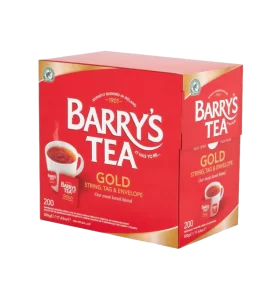
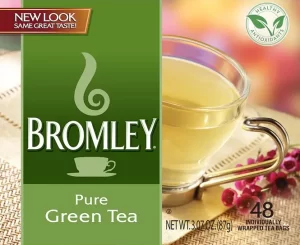
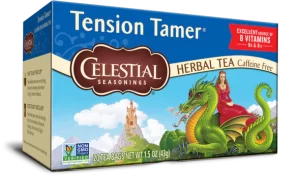
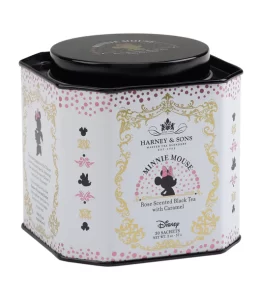
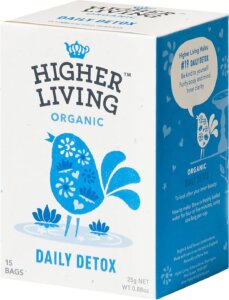
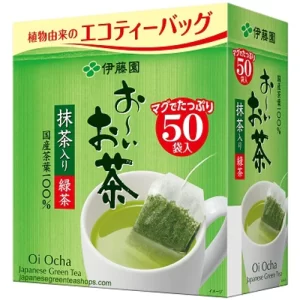
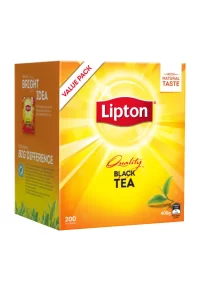
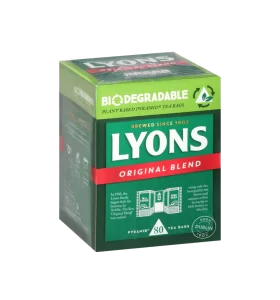
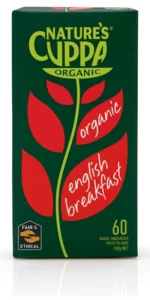
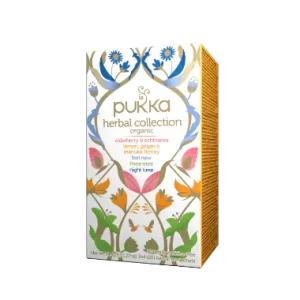
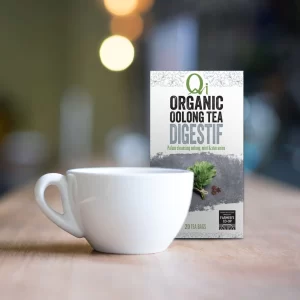
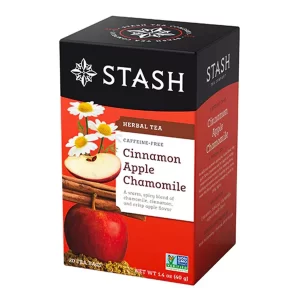
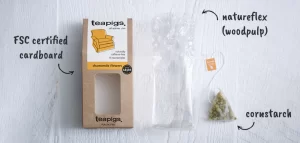
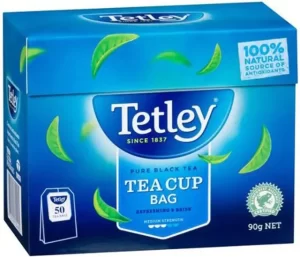
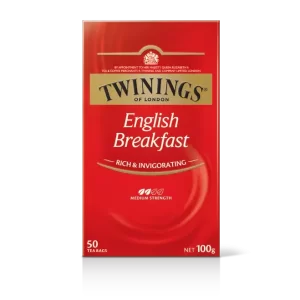
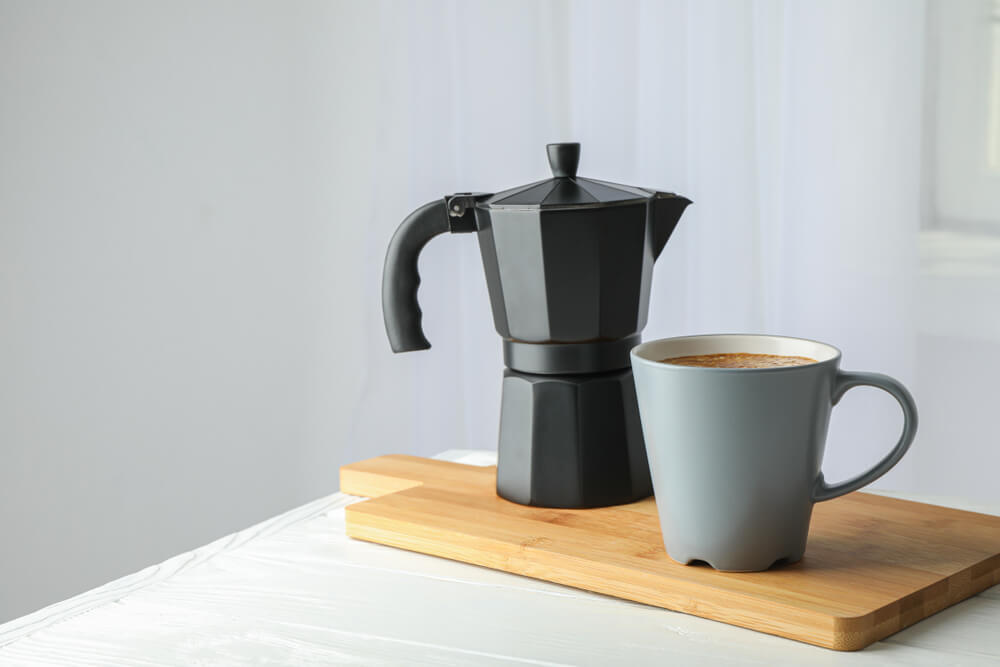


IMPLASTICFREE
January 1, 1970 at 12:00 amThanks Alison, that’s a very good point. When we contacted them, they only mentioned the pyramid bags, didn’t know they also have other tea bags. Thanks for the information, we’ll update our blog post!
Margaret
February 9, 2020 at 6:51 amAre Clipper Tea bags plastic free?
I'M PLASTIC FREE
February 9, 2020 at 9:52 amHi Margaret, we just found this information on their website. Their tea bags are sealed with PLA (poly lactic acid) which is a vegetable based plastic material. I hope this helps. Kind regards, Simona https://www.clipper-teas.com/faq
Gen
April 16, 2024 at 2:38 pmhi, can you please check to see if higher living organic and pukka tea bags are treated with the carcinogenic epichlorohydrin or any PFAS chemicals.
I'm Plastic Free
April 16, 2024 at 5:51 pmHi Gen,
Thanks for your message.
We do our best, however we are a very small team, we’ll try to reach out to the manufacturer but we do not always receive a response.
Kind regards,
Simona
I'm Plastic Free
April 28, 2024 at 10:32 amHi Gen,
Pukka has provided a response (we’ll update the article):
“Hello Simona, we truly appreciate your message and we are so glad that you have chosen Pukka. We want to assure you that our tea bag paper is completely free from any traces of epichlorohydrin. Although it is used in the manufacturing process, our tea bag suppliers regularly conduct checks to ensure its absence. Rest assured, our products comply with all the necessary food regulations in both the EU and the US. Thank you once again for reaching out to us!”
I hope this helps.
Kind regards,
Simona